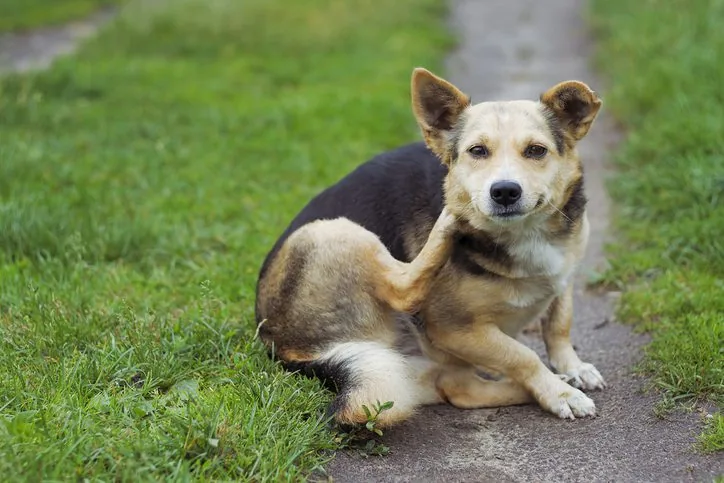Dry Skin on Dogs
Does your dog have dry skin? Do you know how to help? What causes dry skin on dogs, and is this problem ever a cause for concern? In the article below, you’ll find answers to help you better understand your dog’s dry skin issues. We’ll provide information about the causes, risk factors, and solutions for this irritating condition.
With the help of this guide, you should be able to understand which types of dry skin you can try treating on your own at home, and which ones you may need to talk to a vet about instead. Read on to find out more.

Risk Factors
Listed below are the main risk factors to look out for:
Breed
Your dog’s breed may play some role in whether or not she has dry skin. For example, breeds with very short, fine hair or no hair at all are more prone to skin problems than those with longer or thicker coats.
Age
Your dog’s age also makes a difference when it comes to the health of her skin. Senior dogs are more likely to have skin problems, including frequent dry skin, than younger dogs and puppies. Senior dogs may also have other underlying health problems that contribute to their dry skin even more.
Long-term Medication
Dogs who take certain types of long-term medication may be at a greater risk of dry skin than other dogs. This is because dry skin can often be a side effect of canine medication. If you think your dog’s medication is causing her dry skin, talk to your veterinarian to find out more.
Frequent Water Activities
Dogs who spend a lot of time playing in the water are more likely to have dry skin than those who don’t. Water activities contribute to dry skin as well as skin infections, funguses, and other skin health problems in dogs. Keep your dog clean and dry when she isn’t in the water to reduce this risk.
Causes
The main causes of this condition are listed below:
Cold, Dry Weather
When the weather is very cold and dry where you live, your dog may experience dry skin just like you do. There is no cause for concern if your dog’s skin becomes dry during these times of the year. You may choose to use paw and nose balm if your dog’s dry skin is very painful to her.
Food Allergies
Food allergies are the most common cause of dry skin in dogs. Dogs who have food allergies experience duller coats and thinner hair, and they may suffer from other skin and coat health issues as well.
Skin Infections
Skin infections can occur from exposure to water, damage to the skin, fleas, and more. Dogs with skin infections are much more likely to have secondary skin problems, such as dry skin.
Certain Illnesses
Some illnesses, such as Cushing’s disease and hypothyroidism, may cause dry skin in dogs. These conditions are serious and can be fatal, so it is important to work with your veterinarian if your dog is diagnosed with one of these illnesses.
Treatments
The best treatment methods are listed below:
Changing Foods
If your dog’s dry skin is caused by food allergies, try changing her food to see if this helps. Switching to a different protein source is a good first step. You may also try a higher-quality food with fewer filler ingredients to see if this makes a difference, too.
Topical Ointment
Topical ointments and creams may be given by your vet to treat moderate cases of dry skin, especially if the underlying cause is a skin infection or condition. Do not use human topical ointments on your pet unless expressly told to do so by your vet.
Oral Medication
Oral medication may be necessary, depending on the underlying cause of your dog’s dry skin. If your dog has a skin infection or other problem that is difficult to clear up, your vet may prescribe oral medications to help your dog recover more quickly.
Soothing Baths
Some causes of dry skin may improve with the help of a soothing, gentle bath. However, use caution when trying this option, as too much grooming and bathing can cause a dog’s skin to dry out even more. Always dry your dog thoroughly after a bath to prevent further damage to her skin.
Contact a Veterinarian if Your Dog Has Dry Skin
There is always the risk that this problem could be caused by an underlying health problem that needs to be addressed. For this reason, it’s a good idea to have your vet look over your dog’s dry skin if it isn’t responding to treatments.
Your veterinarian can help you get to the bottom of your dog’s dry skin and resolve the issue. If the dry skin is a symptom of a larger problem, your vet is the best resource for dealing with this condition as well. For more information, or if you would like to schedule an appointment, contact Warrick Veterinary Clinic by calling (812) 897-4855.
